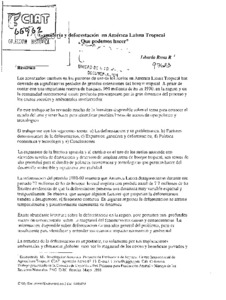Economic crisis, farming systems, and forest cover change in the humid forest zone of Cameroon
The rate of forest clearing by small farmers in the humid forest zone (HFZ) of Cameroon increased significantly in a period of economic crisis dating from 1986. A random sample survey of 648 households was conducted in 54 villages in the HFZ to understand the effect of the crisis and of a 1996 currency devaluation on the practices of small farmers, and the effect of these practices on forest cover change.


